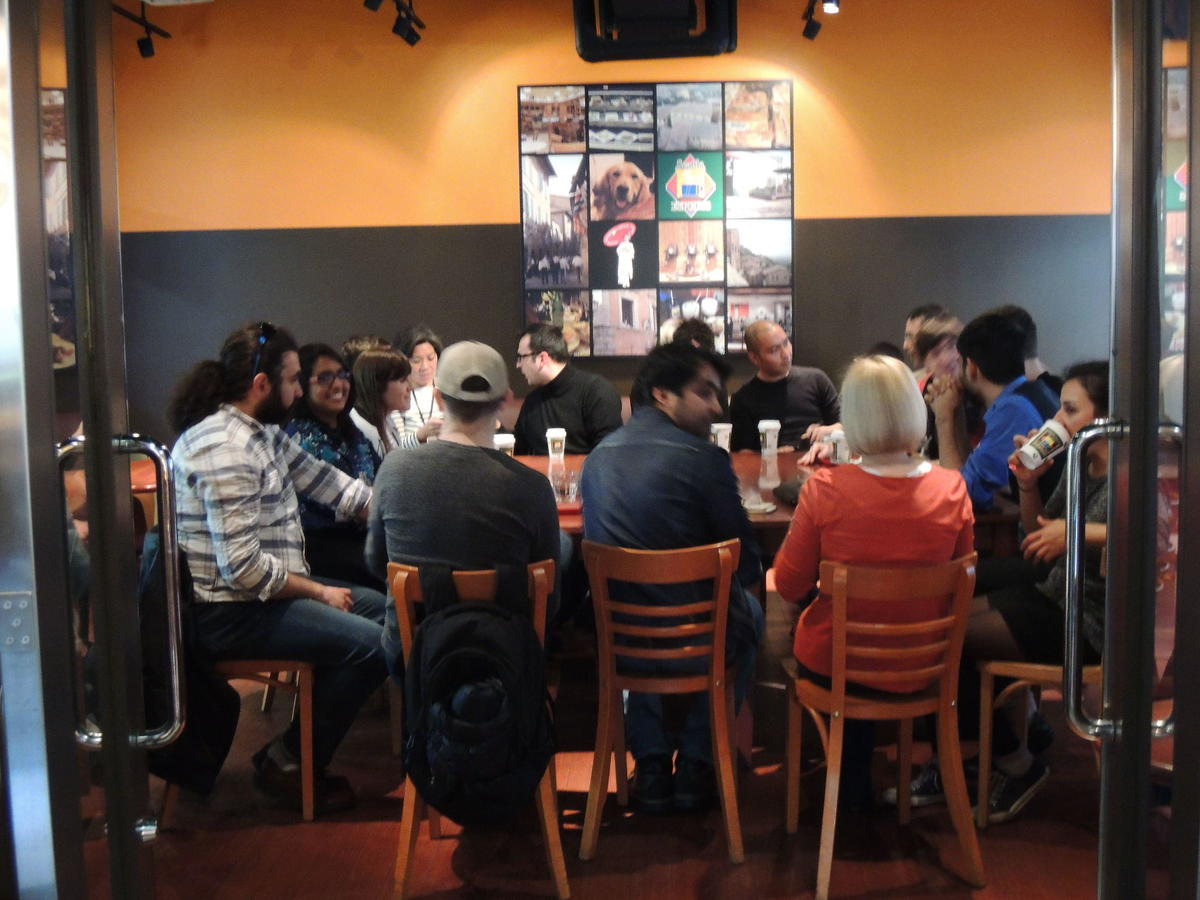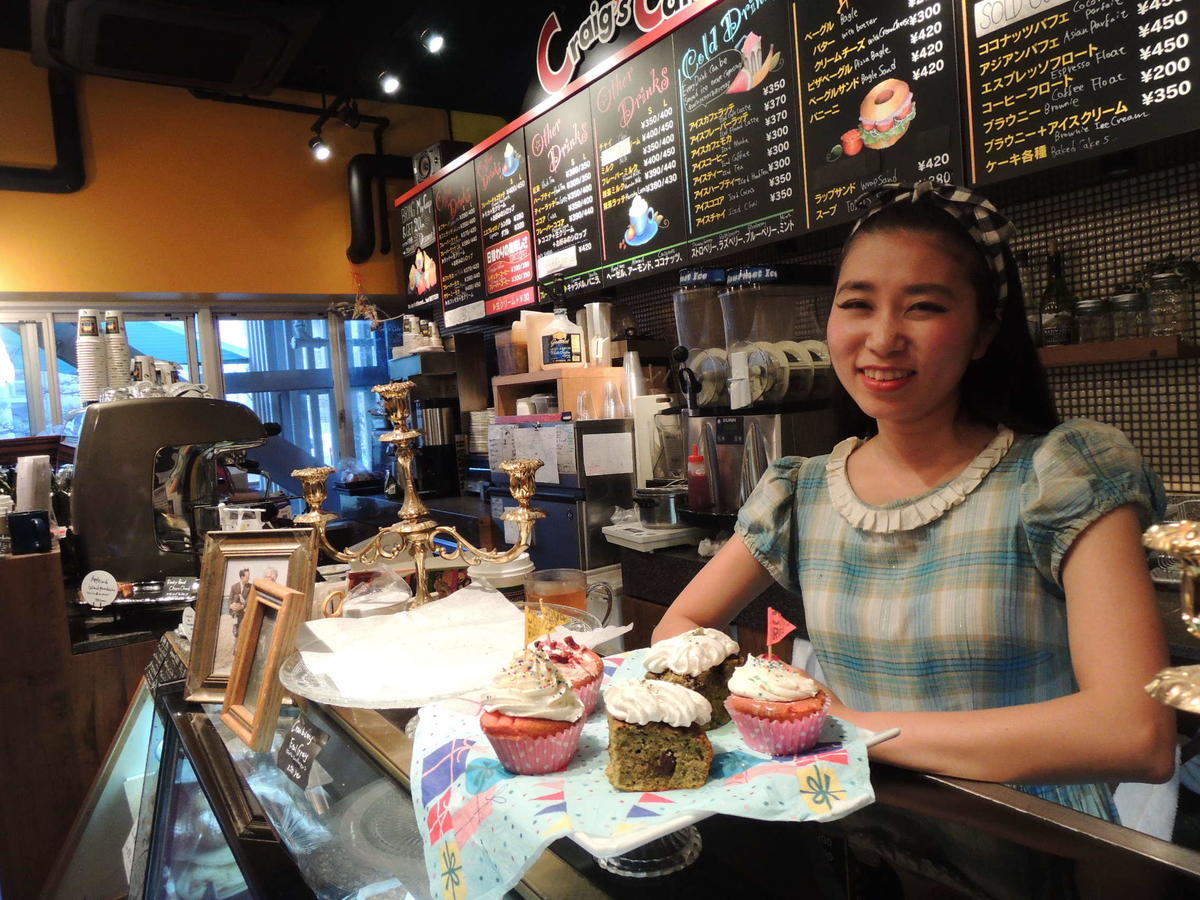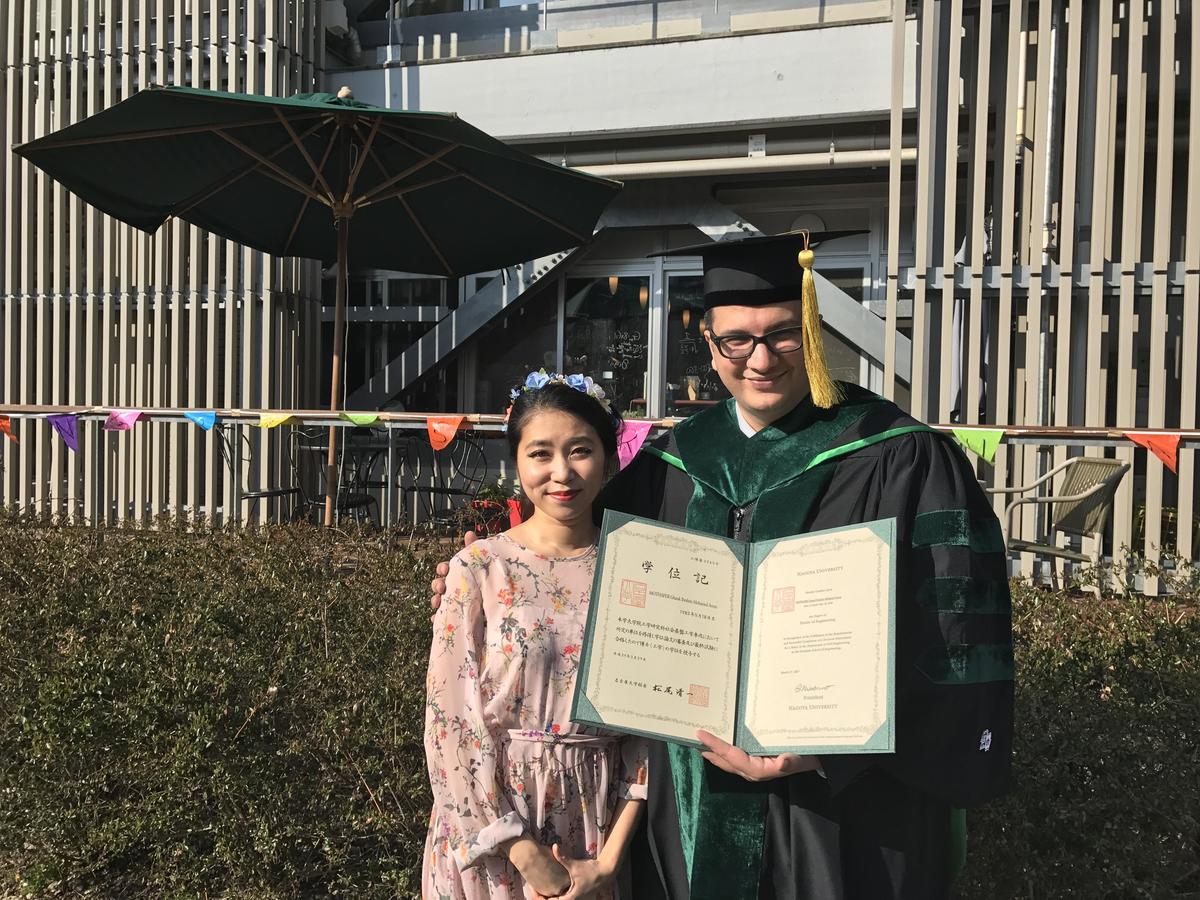April 18, 2017
The Cafe Where It All Began
Nagoya University was alive with the smiling faces of fresh graduates late last March, but for one couple, it was a week of especial joy. On Monday, Mothafer Ghasak, the man in the couple, earned his Ph.D. in engineering, and on Thursday, he and his partner, Eriko Ito, received notice that their marriage application was accepted. More than five years had passed during his Ph.D. course, and a full three years since submitting the application.
There was a reason it took so long: The man is an international student from Iraq, and Nagoya city hall had no prior experience with handling an international marriage with an Iraqi, leaving both scrambling to arrange the necessary paperwork.
The setting of this couple's story is Craig's Cafe, situated in the School of Science on Meidai's Higashiyama Campus. For many students, especially those from abroad, the cafe is an oasis of the soul. The relationship between the manager Ito, who has grown close with such students, and Ghasak sprung from that oasis. I paid a visit to this small but socially vital cafe.
 A gathering of international students at Craig's Cafe
A gathering of international students at Craig's Cafe
Inside the cafe, a hand-written English menu, comfy-looking sofas, framed photos and paintings, and even the color of its lighting give off a warm atmosphere. On the evening I visited, the site of international students gathered around a table reminded me of a cafe in some college town in another country.
As it turns out, the cafe is an American coffee chain, but the real shop would defy your expectations in a good way. The origins of this interior atmosphere go back to when Ito was placed in charge of managing the cafe in April 2012. Originally the cafe was located at Nanzan University, which is not far from the Higashiyama Campus and where Ito worked part-time as a student. When the cafe relocated to Meidai, she became the manager.
The cafe at Nanzan, located at the center of campus, was a popular meeting place for people of various nationalities and fields of study. The first thing that surprised Ito upon coming to Meidai was the clear separation between the sciences and humanities, and that students in each seemed to isolate themselves within their own laboratories. The first thing she did as manager was to change the entire menu into English. As she continued chatting with customers, she was also shocked to hear that many international students received documents in the mail regarding Japan's pension and taxes, but received no explanation and were at a loss about how to process them.
The tax papers, the professors, the girlfriends and boyfriends. . . conversations on these and other topics were exchanged across the counter, turning Craig's Cafe into something of a counseling office for international students. This was partly made possible by the fact that Ito and all of her female staff could speak English. And as she learned to prepare food for people with special dietary needs--such as Muslims who don't eat pork and strict vegetarians who eat no animal products, including fats--her multicultural awareness also grew.
 Eriko Ito, Always smiling at the cafe counter
Eriko Ito, Always smiling at the cafe counter
At Meidai right now, one in eight students are from another country. Their backgrounds are truly diverse. Muslim students, for instance, can have various cultural backgrounds depending on their home country, as well as experiences, such as having moved to Europe as a refugee. It appears that these students have taken to gathering at the cafe for mutual support during hard times, as in the case when a Japanese journalist was murdered by ISIL. Such events no doubt make them fearful that Islam itself would be perceived by society as dangerous.
And while language is typically the greatest barrier to communication, some students shared with Ito their struggle of making Japanese friends despite being proficient in the language. Ito suspected that Japanese students faced their own challenges to reaching out, such as not feeling confident about speaking in English. So she decided to hold a Japanese language cafe once every two weeks for international and Japanese students to converse in Japanese. Both sides participated in roughly equal numbers, which sometimes reached as many as several dozen people.
Eventually Ito made a ritual of asking those who frequented the cafe, including visiting researchers, to write a message on the glass window in white pen. The window, dubbed "the window of philosophy," now includes words of appreciation, an Einstein quote, a mathematical formula, and even data from NASA's Mars rovers.
Ito found one of those messages to be particularly touching. An Indian woman who graduated from an undergraduate school left words expressing that Craig's Cafe was the only oasis she could escape to in the desert of Meidai. Recalling the woman's near-daily visits to the cafe, Ito realized for the first time the difficulty she must have endured. Perhaps the words they exchanged were helpful in some way, thought Ito. Thankfully she was able to graduate without any problems.
Ghasak, now officially Ito's husband, was a cafe customer on Ito's very first day as manager. He shared similar interests with Ito, who had studied philosophy and sociology of religion, and before long they talked almost every day.
Under the Hussein regime in Iraq, obtaining a Ph.D. carried with it the risk of death. Indeed, Ghasak had lost a number of relatives in that way. As a result, Ghasak limited his education in Iraq to a master's degree in civil engineering, and dreamed of getting his Ph.D. in another country. Luckily for him, he achieved some of the highest test scores in the country, affording him the opportunity to study in Japan. His studies in Meidai's Graduate School of Engineering, however, didn't go well at first. Ghasak struggled to keep up.
For Ito, it was five long years of watching him from behind the counter. He was carrying the weight of various burdens day after day: feelings of self-doubt and nervousness about whether he had what it takes to finish the Ph.D. program, and concern for family members exposed to fatal threats in his home country, which was collapsing under terrorism and civil war.
These conditions made it impossible for Ghasak to return to Iraq to obtain the documentation necessary for their marriage--papers showing Ghasak was not already married, for instance. He somehow managed to have family in the country obtain the documents, which was one of the reasons why it took so long for the marriage application to be approved.
Ghasak isn't the only student at Meidai who is a de facto refugee. There are others who left their country on a study visa but have been unable to return due to armed conflict or other reasons. Ito has met a fair number of international students in the painful position of being trapped by invisible barriers.
Through her interactions with such students, Ito says she has learned what it means to have the opportunity of running a cafe at Nagoya University. She hopes to offer any support she can, however small. Establishing the cafe's mission as a "people's lounge for international exchange in science and culture," she has endeavored to create a comforting environment for international students.
There's one thing that worries Ito, however. Now that Ghasak is a doctor and has acquired the Japanese name Gasaku Ito, his next dream is to teach. Since he can't speak Japanese, he will most likely seek a position at universities outside Japan. And if Ito leaves Meidai, she wants Craig's Cafe to continue as it is now. The more support Meidai can offer to international students with various backgrounds and circumstances, the better. In that sense, Craig's Cafe is undoubtedly an indispensable part of campus life at Meidai.
And yet, it's not like anyone asked her. That Ito holds such an important mission for Craig's Cafe makes Meidai one lucky place.
Ghasak, now officially Ito's husband, was a cafe customer on Ito's very first day as manager. He shared similar interests with Ito, who had studied philosophy and sociology of religion, and before long they talked almost every day.
Under the Hussein regime in Iraq, obtaining a Ph.D. carried with it the risk of death. Indeed, Ghasak had lost a number of relatives in that way. As a result, Ghasak limited his education in Iraq to a master's degree in civil engineering, and dreamed of getting his Ph.D. in another country. Luckily for him, he achieved some of the highest test scores in the country, affording him the opportunity to study in Japan. His studies in Meidai's Graduate School of Engineering, however, didn't go well at first. Ghasak struggled to keep up.
For Ito, it was five long years of watching him from behind the counter. He was carrying the weight of various burdens day after day: feelings of self-doubt and nervousness about whether he had what it takes to finish the Ph.D. program, and concern for family members exposed to fatal threats in his home country, which was collapsing under terrorism and civil war.
These conditions made it impossible for Ghasak to return to Iraq to obtain the documentation necessary for their marriage--papers showing Ghasak was not already married, for instance. He somehow managed to have family in the country obtain the documents, which was one of the reasons why it took so long for the marriage application to be approved.
 Ito (left) and Ghasak (right) with his Ph.D. certificate
Ito (left) and Ghasak (right) with his Ph.D. certificate
Through her interactions with such students, Ito says she has learned what it means to have the opportunity of running a cafe at Nagoya University. She hopes to offer any support she can, however small. Establishing the cafe's mission as a "people's lounge for international exchange in science and culture," she has endeavored to create a comforting environment for international students.
There's one thing that worries Ito, however. Now that Ghasak is a doctor and has acquired the Japanese name Gasaku Ito, his next dream is to teach. Since he can't speak Japanese, he will most likely seek a position at universities outside Japan. And if Ito leaves Meidai, she wants Craig's Cafe to continue as it is now. The more support Meidai can offer to international students with various backgrounds and circumstances, the better. In that sense, Craig's Cafe is undoubtedly an indispensable part of campus life at Meidai.
And yet, it's not like anyone asked her. That Ito holds such an important mission for Craig's Cafe makes Meidai one lucky place.

 Subscribe to RSS
Subscribe to RSS